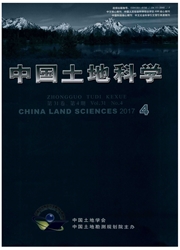

 中文摘要:
中文摘要:
研究目的:从系统角度分析土地、人口、社会、经济、能源对碳排放的影响作用,并对武汉市2017—2030年不同政策情景下的土地利用碳排放进行模拟,为其低碳发展战略和低碳土地利用规划提供决策依据。研究方法:系统动力学方法。研究结果:(1)建立的城市土地利用碳排放系统动力学模型是有效的;(2)按照目前的发展趋势,武汉市的碳排放总量将保持逐年攀升的趋势;(3)经济的快速发展对武汉市土地利用碳排放量的增加具有显著的影响作用;(4)调整土地利用结构、调整产业结构以及提高能源利用效率都能够有效的减少武汉市土地利用碳排放量,其中调整土地利用结构和调整产业结构的作用效果相对来说更加明显。研究结论:转变经济增长方式、升级产业结构、调整土地利用结构和积极研发先进的低碳科学技术是武汉市低碳发展的重要途径。
 英文摘要:
英文摘要:
The purpose of this paper is to analyze the impacts of land, population, society, economy and energy on carbon emission from the perspective of system, to simulate the land use carbon emission system of Wuhan city from 2017 to 2030 with different policies situations, and to provide reference for the low-carbon development strategy and the lowcarbon land-use planning. The method is system dynamics. The result shows that the model is valid. If the current trend continues, the carbon emissions will increase year by year in Wuhan. The rapid economic development has a significant effect on urban land use carbon emissions in Wuhan. Adjusting land use structure and industrial structure and improving energy efficiency can effectively reduce urban land use carbon emissions in Wuhan. In particular, adjusting land use structure and industrial structure has a more obvious effect. It is concluded that transforming the economic growth mode, upgrading the industrial structure, adjusting land use structure, and developing the advanced low carbon technology are the important ways to achieve low-carbon development in Wuhan.
 同期刊论文项目
同期刊论文项目
 同项目期刊论文
同项目期刊论文
 期刊信息
期刊信息
